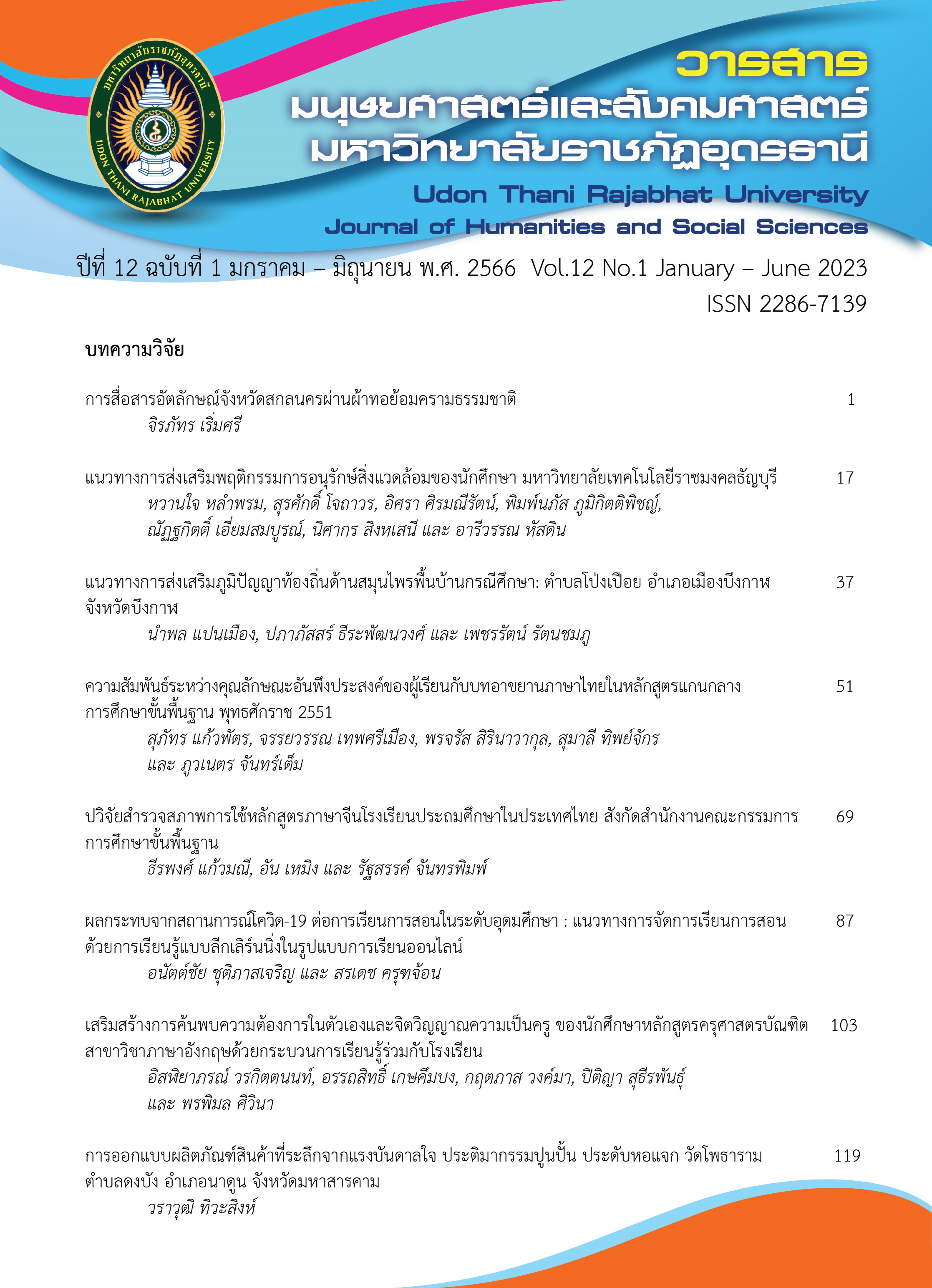ผลกระทบจากสถานการณ์โควิด-19 ต่อการเรียนการสอนในระดับอุดมศึกษา : แนวทางการจัดการเรียนการสอนด้วยการเรียนรู้แบบลีกเลิร์นนิ่ง ในรูปแบบการเรียนออนไลน์
Main Article Content
บทคัดย่อ
การแพร่ระบาดของเชื้อไวรัสโคโรนา 2019 หรือโควิด-19 ส่งผลให้รูปแบบการเรียนการสอนต้องปรับเปลี่ยนไปตามสถานการณ์ที่เกิดขึ้น ซึ่งสร้างความท้าทายให้กับผู้เรียนและผู้สอนเป็นอย่างมาก เช่น การเปลี่ยนการเรียนการสอนแบบปกติไปเป็นแบบออนไลน์ ผลจากงานวิจัยที่เกี่ยวข้องพบว่า การใช้วิธีการสอนแบบปกติในห้องเรียนออนไลน์ที่มีเพียงการบรรยายโดยไม่มีการใช้กิจกรรมการเรียนรู้อื่น ๆ มาสนับสนุน ส่งผลให้ผู้เรียนรู้สึกเบื่อหน่ายได้ง่ายขึ้นกว่าเดิมและมีสมาธิน้อยลง โดยการวิจัยครั้งนี้ใช้วิธีการเรียนการสอนแบบลีกเลิร์นนิ่ง (League Learning) ที่ถูกพัฒนาจากรูปแบบของการแข่งขันอีสปอร์ต (Esports) เพื่อให้เหมาะสมกับผู้เรียนในยุค Z Generation ซึ่งวิธีการเรียนการสอนดังกล่าวใช้สำหรับเพิ่มแรงจูงใจ ความสนใจ ส่งเสริมการเรียนรู้ร่วมกัน การมีส่วนร่วมภายในชั้นเรียน และเพิ่มผลสัมฤทธิ์ทางการเรียนที่ดีขึ้นให้กับผู้เรียน การวิจัยครั้งนี้มีวัตถุประสงค์เพื่อศึกษาผลสัมฤทธิ์ทางการเรียน ความพึงพอใจ และมุมมองของผู้เรียนที่มีต่อการเรียนการสอนแบบลีกเลิร์นนิ่งบนแพลตฟอร์ม (Platform) การเรียนรู้ออนไลน์ กลุ่มตัวอย่างได้แก่ นักศึกษาระดับชั้นปริญญาตรี ภาควิชาคอมพิวเตอร์ศึกษา คณะครุศาสตร์อุตสาหกรรม มหาวิทยาลัยเทคโนโลยีพระจอมเกล้าพระนครเหนือ จำนวน 28 คน การวิเคราะห์ข้อมูลใช้ ค่าเฉลี่ย ส่วนเบี่ยงเบนมาตรฐาน และสถิติทดสอบที ผลการวิจัยพบว่า 1) ผลสัมฤทธิ์ทางการเรียนหลังเรียนสูงกว่าก่อนเรียนอย่างมีนัยสำคัญทางสถิติที่ระดับ .01 และ 2) การประเมินความพึงพอใจของผู้เรียนที่มีต่อการเรียนรู้แบบลีกเลิร์นนิ่งภาพรวมมีความพึงพอใจอยู่ในระดับมาก ( = 4.37, S.D. = 0.70) โดยการเรียนรู้แบบลีกเลิร์นนิ่งสามารถนำไปประยุกต์ใช้กับรายวิชาพื้นฐานให้มีประสิทธิภาพยิ่งขึ้นและได้รับการตอบรับในเชิงบวกจากผู้เรียนรวมถึงแสดงให้เห็นข้อดีที่มีคุณค่ามากมายภายในชั้นเรียน
Article Details
เอกสารอ้างอิง
Adnan, M., & Anwar, K. (2020). Online Learning amid the COVID-19 Pandemic: Students’ Perspectives. Online Submission, 2(1), 45–51.
Azlina, N. N. (2010). CETLs: Supporting collaborative activities among students and teachers through the use of think-pair-share techniques. International Journal of Computer Science Issues (IJCSI), 7(5), 18–29.
Bataineh, M. Z. (2015). Think-pair-share, co op-co op and traditional learning strategies on undergraduate academic performance. Journal of Educational and Social Research, 5(1), 217–226.
Chutipascharoen, A., & Krootjohn, S. (2020). Conceptual Framework on League Learning Management. In The Impact of the 4th Industrial Revolution on Engineering Education: Proceedings of the 22nd International Conference on Interactive Collaborative Learning (ICL2019) (pp. 480–491). Springer International Publishing.
Chutipascharoen, A., & Krootjohn, S. (2021). The importance of generation transferring: A satisfaction comparison of Generation Z undergraduate students towards traditional and league learning methods. In 2021 13th International Conference on Information Technology and Electrical Engineering (ICITEE) (pp. 133–136). IEEE.
Crawford, J., Butler-Henderson, K., Rudolph, J., Malkawi, B., Glowatz, M., Burton, R., Magni, P., & Lam, S. (2020). COVID-19: 20 countries’ higher education intra-period digital pedagogy responses. Journal of Applied Learning & Teaching, 3(1), 9–28.
Daniel, S. J. (2020). Education and the COVID-19 pandemic. Prospects, 49(1), 91–96.
Dewey, J. (1938). Logic: The Theory of Inquiry. New York, USA: Henry Holt.
Dhawan, S. (2020). Online learning: A panacea in the time of COVID-19 crisis. Journal of Educational Technology Systems, 49(1), 5–22.
Doyumgaç, I., Tanhan, A., & Kiymaz, M. S. (2021). Understanding the most important facilitators and barriers for online education during COVID-19 through online photovoice methodology. International Journal of Higher Education, 10(1), 166–190.
García-Morales, V. J., Garrido-Moreno, A., & Martín-Rojas, R. (2021). The transformation of higher education after the COVID disruption: Emerging challenges in an online learning scenario. Frontiers in Psychology, 12, 1–6. https://doi.org/10.3389/fpsyg.2021.616059.
Hoofman, J., & Secord, E. (2021). The effect of COVID-19 on education. Pediatric Clinics, 68(5), 1071–1079.
Lockee, B. B. (2021). Online education in the post-COVID era. Nature Electronics, 4(1), 5–6.
Mailizar, Almanthari, A., Maulina, S., & Bruce, S. (2020). Secondary school Mathematics teachers’ views on E-learning implementation barriers during the COVID-19 pandemic: The case of Indonesia. Eurasia Journal of Mathematics, Science and Technology Education, 16(7), 1–9. https://doi.org/10.29333/ejmste/8240.
Muthuprasad, T., Aiswarya, S., Aditya, K., & Jha, G. K. (2021). Students’ perception and preference for online education in India during COVID-19 pandemic. Social Sciences & Humanities Open, 3(1), 1–11. https://doi.org/10.1016/ j.ssaho.2020.100101.
Neuwirth, L. S., Jović, S., & Mukherji, B. R. (2021). Reimagining higher education during and post-COVID-19: Challenges and opportunities. Journal of Adult and Continuing Education, 27(2), 141–156.
Patil, Y. S., Suryawanshi, A. T., Kumbhar, S. G., & Mane, S. S. (2023). Implementation of a Team Game Tournament a Collaborative Learning Method and Study of its Impact on Learners’ Development. Journal of Engineering Education Transformations, 36, 303–307.
Schwerdt, G., & Wuppermann, A. C. (2011). Is traditional teaching really all that bad? A within-student between-subject approach. Economics of Education Review, 30(2), 365–379.
WHO. (2020). Statement on the second meeting of the International Health Regulations (2005) Emergency Committee regarding the outbreak of novel coronavirus (2019-nCoV). Geneva: World Health Organization.


